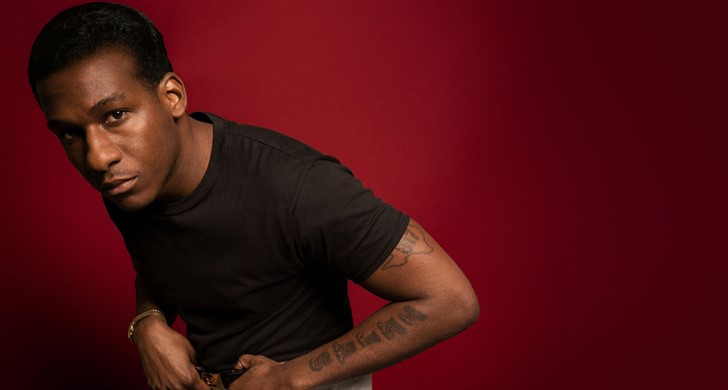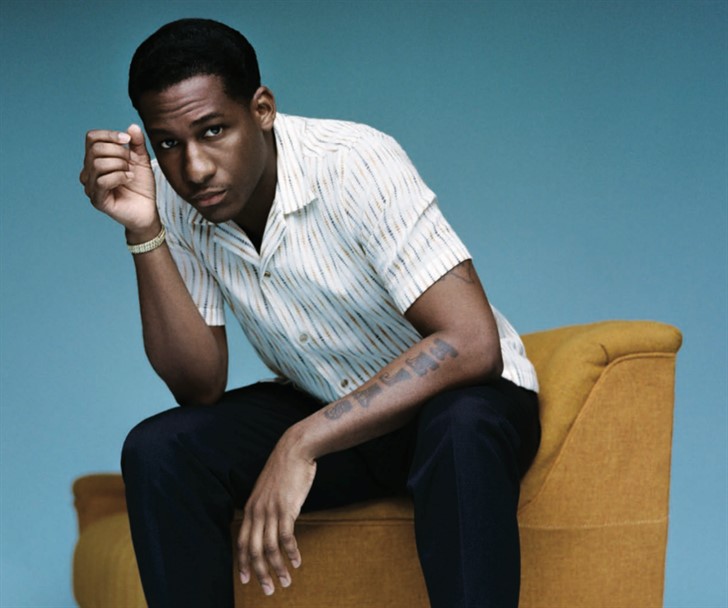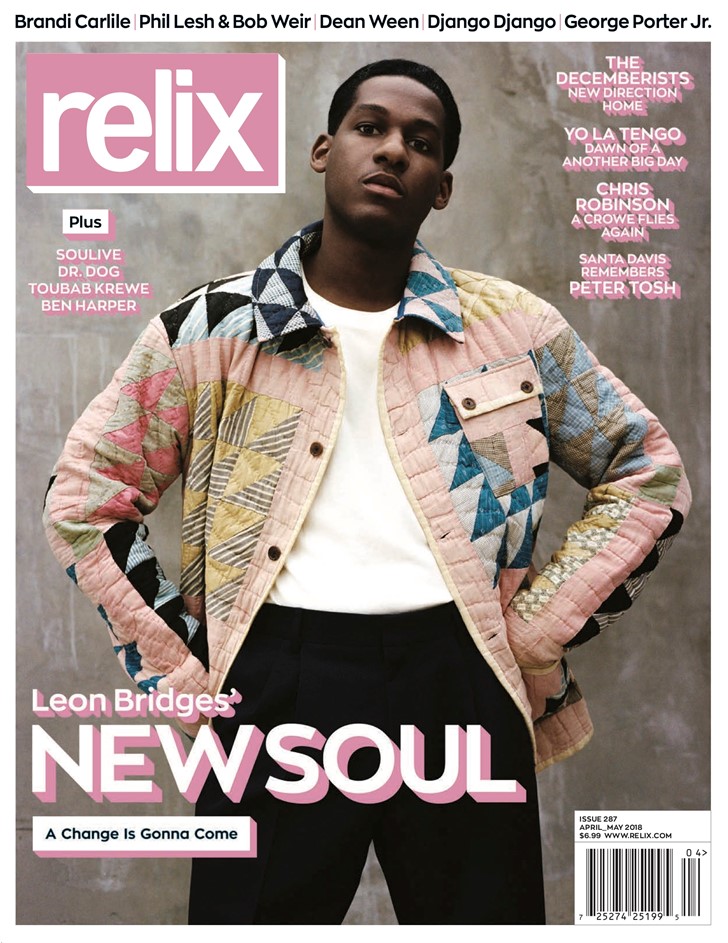Leon Bridges: Hungry is My State of Mind
 Jack McKain
Jack McKain
Something incredible happens right after the string-soaked opening filigree of “Bet Ain’t Worth the Hand,” the leadoff cut from Leon Bridges’ new album, fades into the dewy distance, and it’s so unexpected that it lends the song an immediate and lasting visceral impact. See, there’s this unwritten rule about “the payoff”—that crucial flashpoint during a performance when a singer seems to break through a previously imperceptible barrier and take us higher. The rule is it’s just like making love; you’re supposed to tease it out with a build-up and then, boom, hit it like Aretha does in “I Never Loved a Man,” her voice rising with emotion over the words “I’ll never be free since you got your hooks in me,” and suddenly leaping an octave as she nails that ecstatic “Yeah!” with her raw, sensuous and unbridled energy. She’s possessed by the elevated power of the moment, and we’re right there with her.
So here’s the thing: Bridges hits the payoff on “Bet Ain’t Worth the Hand” with the first line he sings, because he steps to the microphone with a totally unexpected and poignant burst of notes in an upper register that he never thought to try before. “It’s kind of funny,” he says, actually allowing himself a brief chuckle, “because for that particular jam, the guys laid down the instrumental groundwork, and then when I was ready to go, [producer] Ricky Reed suggested, ‘Why don’t you sing this first part in falsetto?’ And I was like, ‘Umm, really?’ At that point, I had never written a falsetto part into one of my songs. But I tried it, and it felt good and sounded good, so we just went with it.”
And, with that one spine-tingling moment, Bridges makes the case that Good Thing is much more than just a reboot of the pristinely retro-soul sound he crafted on his smash debut Coming Home. That album, which he recorded in his native Fort Worth, Texas, with fellow travelers Austin Jenkins and Josh Block—guitarist and drummer in the hyper-inventive boogie-blues-rock band White Denim, respectively—was a triumph of instant chemistry, ingenuity and damn good timing. (Jenkins and Block have since left White Denim and have teamed up with Chris Vivion to found the Niles City Sound studio.)
But after landing a deal with Columbia and hitting the road for most of the next three years, Bridges and company found that the new ideas were coming too fast and furious, and needed to be documented.
“We actually recorded quite a bit of material that wasn’t on the Good Thing album you hear today,” Jenkins recalls. “What you hear now is a culmination of all the points of entry that we were looking at over the year and a half that we were doing stuff here at the studio, before we took everything out to Los Angeles. Leon was writing on the road a lot when we were on tour, and then we’d come in and lay some of those ideas down. Sometimes that would be the full band tracking live, or sometimes it would be a new idea that needed fleshing out. And he went far out at one point, to where we were pushing the limits of where it could go. Leon was very conscious, in a cool and brave way, to not just make Coming Home 2.0. And I love that—if Coming Home was his homage to a certain era of R&B and soul, then I’d call this record a homage to R&B and soul in all forms.”
A fateful bend in the road came up in late 2016, when Bridges agreed to do a cameo on a track called “Liberated,” recorded by Detroit hip-hopper DeJ Loaf and produced by Ricky Reed. Known for his high-profile work in rap and pop (Pitbull, Robin Thicke, Meghan Trainor, Kesha and more), as well as his own Bay Area-based electropop group Wallpaper, Reed became a smoking-hot ticket after signing a label and production deal with Atlantic earlier that year, and thoroughly impressed Bridges not only with his command of the studio, but also with his keen ear for tapping into vocal nuances that even Bridges himself hadn’t thought to explore.
“Ricky really brought that out of me,” he explains. “On that DeJ Loaf song, I’m singing in another high register, not quite falsetto, that a lot of people haven’t heard me do, and I didn’t know that I could really sing there. So when we started thinking about making this second album, it just made sense to collaborate with him again. He’s definitely a unique guy and a real musician—that was the great thing about having him in the mix. It’s easy for me to sit by myself and write songs and do shit that’s comfortable, but Ricky was able to push me into new territory.”
As stunning as it is, “Bet Ain’t Worth the Hand,” with its dreamy Philly soul textures reminiscent of the Delfonics, is just the jumping-off point for a dizzying 10-song set that dips into everything from silky-smooth club bangers (“Bad Bad News”) to Dilla-style broken beat hip-hop (“Lions”) to after-hours jazz with one foot in the church (“Georgia to Texas”). But even with such a wide range of musical touch points, and with the whole experience squeezed into the relatively narrow space of 35 minutes, Good Thing still manages to achieve what was baked into Coming Home from the get-go: a seamlessly unified sound that’s meant to guide us toward an appreciation of Bridges’ growth as a singer-songwriter of unusual depth. And even now, he’s still testing the limits of where he can take his music.
“This was just a really cool experience,” Jenkins says, referring to the supportive atmosphere at Reed’s Elysian Park studio in Los Angeles, as well as the outstanding caliber of musicians that Reed and the Niles City crew managed to recruit for the sessions. Jenkins and Block play on several Good Thing tracks, including the bouncy “Shy” and the discofied “If It Feels Good (Then It Must Be),” which also finds LA guitar-slinger Nate Mercereau channeling Chic-era Nile Rodgers with astonishing ease. “When we started thinking about how to synthesize the record that Leon wanted to make, we realized we wanted it to bump in a certain way. Ricky is unbelievably talented at getting people to be on the same page about things like that, which I think is the number-one tenet of production. He leads the team, but not from a position of arrogance. He’s just right there doing the work. I couldn’t say enough about how good that process is.”
As a prime example of the triumph of the collaborative spirit, Bridges points to “Lions,” which features multi-instrumentalists Zach Cooper and Victor Dimotsis out of Asheville, N.C., who play together under the name King Garbage. The song harnesses the hard-edged, Muscle Shoals-influenced rhythmic approach that Cooper and Dimotsis have perfected together, but it also recalls the neo-soul stylings of the Soulquarians, the loose collective behind D’Angelo’s classic Voodoo, Common’s Like Water for Chocolate and many more.
“It was a little rough for me at first,” Bridges admits, “because it was hard to be in a room and have to trust these guys who were almost strangers to me, except for Austin and Josh, and then to have to give them input, too. I remember that day—Ricky has this cool little garden spot at his studio, so we went down there first, and we sat and chatted. Then we went up and we just attacked it, and the crazy thing is: We didn’t expect to come up with a song like ‘Lions.’ Sometimes we’d be in the studio and, if we hit a wall, we’d just cut it and go home. We wouldn’t continue to try to write, and that was a tough thing about it too. But everything in that song was created at Ricky’s studio, with me singing into an SM7 microphone slouched over the counter, you know? It couldn’t be any more relaxed.”
 Jack McKain
Jack McKain
Todd Bridges was born in Atlanta in 1989 and moved with his family to New Orleans as a small child before they ultimately landed in North Texas. He grew up in the church, where he was exposed to gospel music, and studied dance for a spell in college outside Fort Worth, Texas, before leaving school to work at restaurants like Rosa’s Cafe and Del Fresco’s Grille and play the open-mic circuit. After being told that he resembled Leon Robinson, the actor who played singer David Ruffin in the 1998 film The Temptations, he adopted his current stage name. One story that bears retelling is how Bridges and Austin Jenkins
first met; there’s little doubt now that, one day, it will become the stuff of legend.
It feels almost quaint to consider that their phenomenal ride together began at the tiny Magnolia Motor Lodge on Morton Street in Fort Worth, when, on one balmy Tuesday night, Bridges stepped up onstage between sets to sing a few songs on guitar. Jenkins happened to be in the audience, and was blown away by what he heard. And we all know what happened next.
“It’s beautiful, man,” Bridges says with gratitude, calling up how connected he still feels to family back home. “It really keeps me grounded because it’s just refreshing to get back and see my mother and father and some of my best friends, and just forget about the whole music-industry thing for a minute. Everything is pure. Musicians there don’t play to get discovered. You play because you love it. Fort Worth doesn’t really have an infrastructure to make it, even if you wanted to, so that’s what makes my story so unique. Meeting Austin Jenkins over a pair of Wrangler jeans, and then him approaching me at the Magnolia—that’s crazy. A lot of those times, I was using my mom’s car, and lying and saying I was working late. I was just playing for the love of music. If I wasn’t there that particular night, who knows? I might have never been in the situation that changed my life.”
As a lyricist, Bridges naturally hits on the central theme that has been the lifeblood of rhythm and blues for generations: love in all its permutations, including, most important, pleasure and pain. But he also wields a vivid air for the troubadour’s vernacular, weaving elaborate and poetic narratives into songs like “Lisa Sawyer,” a centerpiece of Coming Home that tells the story of his mother’s birth and childhood growing up in New Orleans.
A few songs on Good Thing embrace all this and more—feelings of tenderness, vulnerability, uncertainty and, on the other side of the coin, the need to stay grounded, to assert strength, and to break free from fears and constrictions and set your own path. “Lions,” with its opening line of “Hungry is my state of mind,” certainly fits the blueprint for self-determination, while the outstanding ballad “Beyond,” which Bridges says draws some inspiration from the music of Van Morrison, accentuates a deep awareness—in as simple a line as “I love to see her face in daylight”—of how patience and mutual respect play just as vital a role in a relationship as what goes on between the sheets.
“When I approach a song like that, I never try to approach it in a linear way,” Bridges observes. “I try to do something fresh and new over it. So you hear an acoustic guitar that has a Van Morrison kind of vibe, but the way I’m singing over it, you hear a freaking Ginuwine melody—straight R&B. I love incorporating stuff like that, just to make it as fresh as I can. And it’s the same with the words. It’s about respecting the woman I’m singing about, beyond just objectifying her. I’m the kind of person who moves fast. I’m not some hopeless romantic, but when the time for love is ready, that’s when I will be. It’s always fun to make love, but I also have to dig you as a person. That’s what ‘Beyond’ is about, and really that was the whole point of this album. I wanted to create this kind of direct poetry within a song. I didn’t want to make something that people felt like they can’t connect with, you know?”
Bridges is really at his best when he folds this level of imagery and detail into his songwriting and, of course, the more personal he gets, the deeper the impression he leaves. The album’s meditative closer “Georgia to Texas” proves the point. Over a lonely acoustic bass line, he eases into the story of his mother’s pregnancy and his own birth in Atlanta. As the drums, piano and saxophone join the mix, he expands into all the awkward and uncomfortable truths of being a teenager (“I learned in school I didn’t measure up / I fell short on what true progress was”), before eventually circling back to draw strength from his mother’s protective embrace (“504”—the New Orleans area code—“black girl, carry me”). You almost have to telescope back to Prince’s ‘80s heyday to find lyrics that are this bold and confessional, but stripped down to an essence that anyone can understand.
And this is where Fort Worth itself comes into the picture—a former Army outpost in North Texas that stands in the shadows of cities like Austin, Dallas, Houston and San Antonio, but was nevertheless home to some hugely influential musicians, from Bob Wills to King Curtis to Ornette Coleman to Cornell Dupree. “To me, one thing that links them all is that they have a lot of heart and soul,” Jenkins says, “and then there’s this ability to tell a story. That’s what really has the history of Fort Worth wrapped up in a weird way—because it’s right on the edge of the West. It’s this gateway to the expanse of Texas. Leon was the first person I met who I feel like epitomizes that story, of what this area brings. And it’s so cool that he represents it onstage in the way he does. You can sense that part of him.”
This article originally appears as the cover story in the April/May 2018 issue of Relix. For more features, interviews, album reviews and more, subscribe here.




















